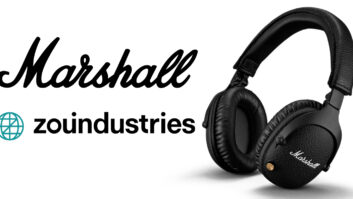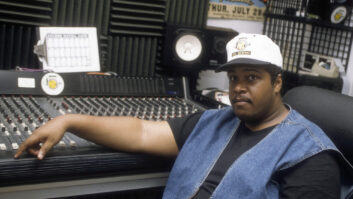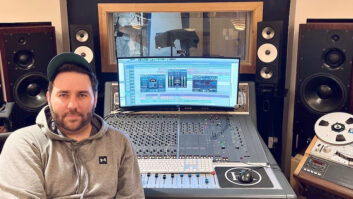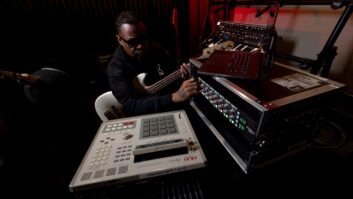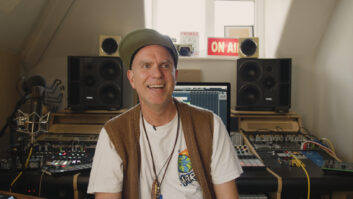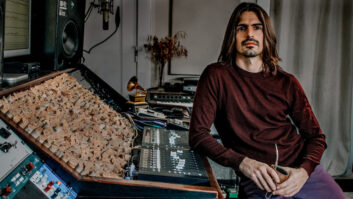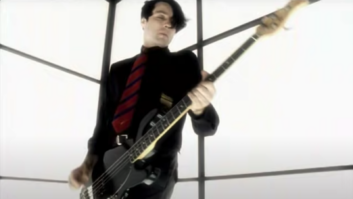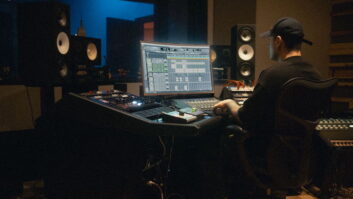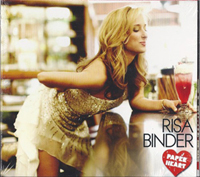
How did you hook up with Risa originally?
My manager introduced me to her. They’re friends who knew each other through something in New York, and I guess I produced a couple of records that Risa was a fan of—maybe Rosi Golan record and Natasha Bedingfield. It was awhile ago. Risa’s record was the first one I made after moving to Nashville from L.A.
I didn’t realize you’d actually moved there.
Yeah, it was an interesting process. I’ve been searching for a new band and kind of doing one-offs here and there and I knew I could find a country band here really easily and when I committed to doing Risa’s record I knew I was going to have to find a really killer pop band—and I managed to. The guys who made that record are all people I work with now.
They’re all Nashville guys?
They’re all Nashville locals, though they’re from all over the place originally. The drummer, Jeremy Lutito, plays in a band called Leagues, but he used to play with Carney, and was on those records. One of the guitar players is Adam Schonfeld who’s one of the biggest guitar players in town on country stuff, but he’s a ridiculous pop player, too. Mike Payne is also a busy pop guitar player here and a really good country player. Tim Lauer, the keyboard player, is an old friend here who’s played on some country records for me.
The keys are prominent on this album.
I wanted that because Risa’s record is not really a power-pop record; it’s more an indie intelli-pop record. The keys play a big part in it. Part of my process as a producer is I do a lot of preproduction because I want to deconstruct and reconstruct the songs a couple of times before I get into the studio with musicians. Then, every time I pulled up the songs it led me to different keyboard sounds. I think it fits her voice well.
I like that it’s spare. You let her voice do the work in most of the songs.
She has a great voice and she’s very particular about her production. For me, if the vocal’s not right, whatever else you do is irrelevant, so I try to build tracks around the singers that I work with. None of my records sound the same, but I hope the vocals come through on all of them.
So, you did this at Smoakstack Studios in Nashville? Are you friends with [owner] Paul Moak?
Yes. His studio is a quarter of a mile from mine. I have a studio on the House of Blues compound and we were supposed to track in A, which is the big room here, because my space is really an overdub space. But Alison Krauss & Union Station were in the middle making a record there and the day before they were supposed to end and we were supposed to start, Allison grabbed me in the parking lot and said, “Hey, would you be able to move your session a week later?”
“Oh, because you have, like, 24 Grammys we have to move our session?”
Actually, if she asked me to move it to China, I would! [Laughs] But fortunately Moak’s studio was open, and his room is amazing! It’s just a playground—it has everything you could imagine. There’s always something to get creative with. Sonically it’s a great room, but the room itself has all these instruments and all this vibe. Whether or not you’re using any of that, you feel a little bump of creativity in there, which I really like.
So, were you going through the SSL there to Pro Tools?
Yeah. I think we brought in some API lunchbox for the drums. Eric Robinson recorded the record. I’ve probably made 25 or 30 records with him. We were holed up in a studio together in L.A. for about six years making records. He still lives in L.A.
What mic did you use on Risa?
I think we used big Blue Bottle, with a B6 capsule, and I’ve also got an old [Neumann] 47 for softer vocals. We’ll have that go into a [BAE] 312 [mic pre] into a Distressor; no EQ to tape.
You co-wrote a few of the songs. Were they demo’d out before the tracking session, or were you writing in the studio and then cutting them?
With Risa, there was some triage. She brought in some songs that I loved and that we didn’t touch, other than the arrangements, and then she brought in some songs that I thought could be a little better. I’m very, very careful about putting my name on a song with a writer when I’m producing a record if I didn’t write it prior to production. I always leave it up to the artist. The songs I’m credited on were some we wrote parts of together.
She brought in an acoustic demo. “Here’s how this could maybe be better. Here’s how this pre-chorus would work better, here’s how this chorus could open up more.” One of the things I try to do is get very sparse one-instrument, one-vocal demos of everything for the record, so I can live with the music and use my imagination to hear what’s not there, as opposed to hearing through what the artist has produced in a demo session, or produced on their own in Garbage Band or wherever. It gives me a little bit more room to be creative in my head.
